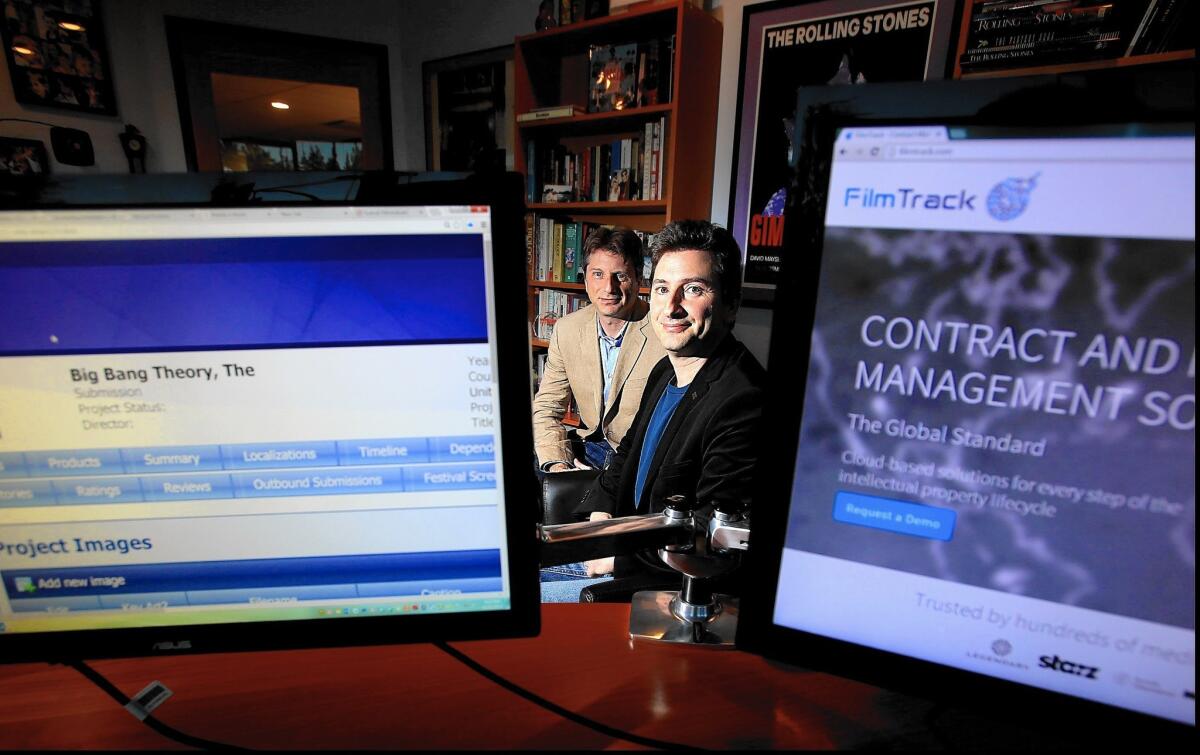FilmTrack software helps Hollywood keep tabs on content

Back in the 1990s, Jason Kassin was just another aspiring L.A. actor, surviving on a second job.
But instead of waiting tables, he relied on his skills as a self-taught computer programmer.
âIâd leave an audition, go home and code,â said Kassin, 46.
The coding â not the acting â would be Kassinâs path to a big Hollywood career. Now heâs the chief executive of FilmTrack Inc., a Studio City company whose content- and rights-management software helps entertainment firms keep tabs on their intellectual property.
Customers use the cloud-based system to track more than 4 million pieces of content, everything from individual television episodes and films to music videos and trailers. Among the companyâs roughly 200 clients are CBS Broadcasting Inc., DreamWorks Animation and Weinstein Co.
FilmTrack launched in 2001 but has come of age more recently in an era of rapid change in the entertainment business.
Hollywood has dramatically increased its global presence over the last decade, ushering in a period of growth for overseas film and TV markets. At the same time, the digital boom has introduced new mediums â such as video-on-demand services like Netflix â that can be mined for additional revenue.
This has made organizing content and tracking rights considerably more complicated â and more lucrative.
âItâs very important to be able to wring more revenue out of your properties,â digital media consultant Bill Rosenblatt said.
In other industries, a simple spreadsheet might suffice to keep track of sales. But in Hollywood, the same piece of content can be sold many times.
âYou are selling the same thing to different geographies, to different people, for different periods of time, in different mediums,â said Kassin, who grew up in Brooklyn, N.Y.
FilmTrack can organize many parts of a creative project. It can create and store contracts, as well as the content itself and its marketing materials.
A movie company could, for example, use the software to determine whether it has the rights to sell one of its films to a distributor in a foreign country, or license it to a domestic video-on-demand service. Then, if a sale is made, the seller could use FilmTrack to help write the contracts and deliver the film and promotional materials to the buyer.
The system enables companies to impose order on the chaos of global distribution.
âMajor companies canât put their fingers on what rights they have,â said Lynn Fero, a senior vice president at CBS who oversees rights management.
Fero said that before CBSâ recent switch to FilmTrack, her company relied on decades-old software that had been developed for Paramount Pictures, a former sister company of the network. CBS now uses FilmTrack to organize more than 60,000 hours of content.
FilmTrack competes for Hollywood business against a handful of software industry heavy hitters, including Oracle Corp. and SAP. Kassin believes that FilmTrackâs key advantage is a team of computer programmers who also understand Hollywood.
Fero said the software âthinks like we think.â
âWhat I like about the FilmTrack software is that it is the only software that speaks my language,â she said. âMost of the other software was trying to be like a super Excel spreadsheet.â
Kassin gained some of that Hollywood know-how from some successes in acting and screenwriting. He appeared in the comedies âKicking and Screamingâ and âReady to Rumble,â and sold scripts to Paramount Pictures, DreamWorks Studios and others.
But it was his computer programming work that caught the notice of friends in the entertainment business.
âWe would be waiting tables and he was a guy who could come fix your computer system in your office and charge an hourly wage for that,â said âFlightâ screenwriter John Gatins.
Kassinâs first Hollywood programming job was for movie company Overseas FilmGroup Inc., which in the mid-1990s paid him to write software that would track the companyâs film portfolio.
Over the next few years, other film companies asked to buy a version of the software he created for Overseas, but Kassin rebuffed them so he could focus on acting and writing.
But the news of his wifeâs pregnancy in May 2001 shifted his priorities.
âI had what we refer to as a panic attack,â he joked.
Kassin called his brother, Stephen Kassin, and pitched him on going into business together, selling software similar to the program he developed for Overseas. The timing of FilmTrackâs launch was fortuitous: Video-on-demand services were proliferating in the mid-2000s, along with foreign interest in Hollywood content.
In addition to competitors like Oracle, FilmTrack, which employs 77 people, also faces a challenge from other small specialty software makers such as Fadel Partners and RSG Media.
Although Kassin touts FilmTrackâs Hollywood expertise, Rosenblatt, the digital media consultant, said the companyâs focus on entertainment would limit its growth. Film and TV rights management is a relatively small niche, he said, and bigger competitors consider it an ancillary business to their larger, more bankable pursuits, such as accounting software.
âThis is not a type of software you are going to be able to grow into a huge, billion-dollar software company,â said Rosenblatt, founder of GiantSteps Media Technology Strategies. âThis is not going to be Microsoft.â
Kassin said FilmTrackâs revenue in 2014 was more than double its revenue in 2013. But he declined to disclose whether the company, which is backed by private equity firm Insight Venture Partners, was profitable last year.
A company affiliated with FilmTrack could take the business a step further. RightsTrade â which counts the Kassin brothers as investors and board members â allows buyers to screen films and TV shows and make offers to purchase their rights.
Starting in May, RightsTrade, which uses FilmTrack technology, will become a marketplace hosting transactions between the buyers and sellers.
But there are risks. Trade events such as the American Film Market have long been important marketplaces for the sale of intellectual property. Chad Eschinger, an analyst for technology research firm Gartner, said RightsTrade could rankle âthe middlemen and people whoâve controlled access,â and that some in Hollywood âmight try to fend off the use of those technologies.â
Kassin stopped pursuing acting and writing the mid-2000s to focus on FilmTrack. Even if he sometimes misses the creative side of Hollywood, he remembers the tough parts, too.
âWhen people ask whatâs the difference between screenwriting and writing software, I say, âOne is a very creative, collaborative exercise where you have to work well with others â and the other is screenwriting,â he said.
Twitter: @DanielNMiller
More to Read
From the Oscars to the Emmys.
Get the Envelope newsletter for exclusive awards season coverage, behind-the-scenes stories from the Envelope podcast and columnist Glenn Whippâs must-read analysis.
You may occasionally receive promotional content from the Los Angeles Times.











